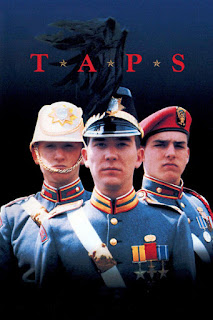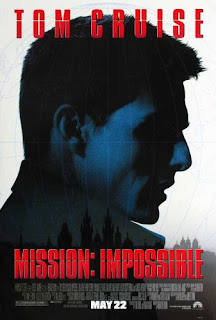Magnolia (1999)
This is where I would normally say this is Part 21 of my Tom Cruise rewind series, but COVID sort of ruined everything and I haven't updated it in two years because of how often the release date for Top Gun: Maverick was pushed back. This was the film that was next on that list, so it deserves something from me, I feel, even if my heart is not quite in it the way it once was.
Just like I said for Eyes Wide Shut, Magnolia required me to really mentally prepare myself to rewatch. The film itself is not why I delayed rewatching it for two years -- genuinely, I had a lot of stuff going on in the meantime, such as my 70 hour work weeks last summer -- but it is also true for me to say that this is a film I did have to be in the right mood to watch. And finally I was in the right mood, had the time to do it, AND wanted to actually see it -- so it worked out for me finally.
The most casual way to describe this movie is by saying that Magnolia is a film about daddy issues. The interweaving of the characters relies on the presence of a father who has absolutely decimated his child emotionally. It also frequently employs references and allusions to the Book of Exodus, something that I find particularly interesting. After all, Exodus is about God leading the Israelites out of slavery, and analyses I've seen of the film have stated that, in this movie, the children are the Israelites and their fathers are the Egyptians. But God is the "Father" of the Israelites, and the rest of Hebrew Bible is largely about the Israelites repeatedly making mistakes and turning against God's commands over and over and over, such as when the Israelites were condemned to wandering the desert for 40 years for disobeying God, and when Moses was forbidden from entering the Promised Land altogether for the same reason. With this in mind, I wonder about the implications of specifically using the Exodus imagery and if, somehow, God is implicated in the legacy of bad fathers here, even if in the most abstract sense possible. The heavy focus on chance in the film -- as opposed to fate, destiny, or God's will -- reifies this more irreverent position.
But I am not here to provide some intelligent discussion on Magnolia. After all, this is my Tom Cruise series, and Tom Cruise I will discuss. In full truth, the most interesting part of this film to me is the casting of Tom Cruise in the Frank T. J. Mackey role. He is, of course, fantastic in it; he earned his third and final Oscar nomination for this performance, and many people point to it as his best performance of all time and even the best performance in the film. Frank T. J. Mackey is a pick-up artist, a slimy, arrogant, repulsive man who is simultaneously a satire and a sober reflection of similar misogynists of the time and the Alpha Male culture of today. But Paul Thomas Anderson is a director who is drawn to the nuance, contradictions, and complexity that is true of each and every one of our existences; and so Frank is not decidedly bad or good, but just another human being with aspects that push us away and compel us all at once.
The reason for my interest in Cruise's casting in this film is that Frank's character parallels Cruise's personal life to such a degree that I wonder how intimately PTA knew Cruise beforehand. No, Cruise is not a loud-mouthed male chauvinist; but Frank is an insecure loser who obscures his past and feels attacked when anybody tries to pry any deeper to understand who he is. He teaches men how to "tame the cunt" but is profoundly lonely. This is not a carbon copy of Cruise, but there are similarities to be found. For instance, in 1984, Rona Barrett interviewed Tom Cruise. She reflected on this interview in a 2016 Buzzfeed article:
“I knew something was slightly wrong. I’d done a ton of research on him ... which was hard to do, since there wasn’t a lot out on him. But one his friends told me that Tom had been studying for the priesthood.” So once she and Cruise established a rapport, Barrett asked, “What made you want to become a priest?”
“He didn’t know how to answer ... And when the interview was over, he went over to his publicist, Pat Kingsley, and said, ‘You must promise me that never again will you allow Rona Barrett to interview me. That woman is a psychologist. I felt like I had been through a session with a doctor.’”
“I think Tom was really scared during that period ... That someone would come out and say something. His family was very protective of him, but his mother told me so many things about him over the phone. Never would talk to me again after that!”
It is also worth mentioning that in 1984, Cruise's father, Thomas Cruise Mapother III, died from cancer. Mapother was a short-tempered alcoholic who frequently directed his bouts of anger at a young Cruise through physical violence and emotional abuse. He struggled to hold down a job, resulting in frequent moves as he sought employment. In the early 70s, the Mapothers ended up in Canada. In 1974, Cruise’s mother, Mary Lee Pfeiffer, gathered Cruise and his sisters up in the middle of the night and left the country to return to her family in Kentucky. Cruise only saw his father one time in the next decade and had no contact with him otherwise.
Cruise has spoken about his father’s death before, saying in a 2006 article with Parade magazine:
He was in the hospital dying of cancer, and he would only meet me on the basis that I didn’t ask him anything about the past. When I saw him in pain, I thought, ‘Wow, what a lonely life.’ He was in his late 40s. It was sad.
Although Cruise has stated that he made peace with his father, Philip Seymour Hoffman later said that the scene where Frank confronts his father on his death bed was not scripted. As succinctly written up on the IMDb trivia page for the film:
[E]verything after Frank's "I'm not going to cry for you" was improvised by Tom Cruise. Cruise didn't feel the scripted lines worked and Paul Thomas Anderson told Cruise to think of when his own father died and to let it move him. During the next take Cruise broke down sobbing, resulting in the scene seen in the film. Hoffman stated Phil's reaction to Frank sobbing was his own, since he didn't know Cruise would enter such a zone and he felt the purity of Cruise's emotion.
(And if you’d like to check, you can scroll down to page 166 here. It looks like an early draft regardless, but I think this story is true, given Cruise’s history with his own father.)
Although Cruise had not totally gone off the deep end with Scientology at this point, Frank’s self-imposed isolation and deep distrust of others almost feels like an omen for what is about to come in Cruise’s life. Additionally, Cruise was very deeply connected with Mary Lee and continues to feel protective of his three sisters, another interesting parallel with Frank’s own relationship with his mother. Cruise’s tendency to lionize himself as a defender of not only himself or his family but society in general, combined with his astronomically high standards that have led to allegations of controlling, arrogant, and hostile behavior to various extents, really raises the question: did PTA do this on purpose? The fact that he made The Master later and purposely called Cruise over to watch it leads me to believe that there was some element of intentionality behind it, but it could have also just been chance.
As for my opinion on it, I enjoyed it more on the second watch. Many laud it as the best film of Cruise’s career, which I find to be a fair assessment. It is not personally my favorite Cruise movie, but it is an excellent film that manages to be human and optimistic in a way that so many filmmakers nowadays can only hope to achieve.
Rating - 4/5; August 9, 2023





Comments
Post a Comment